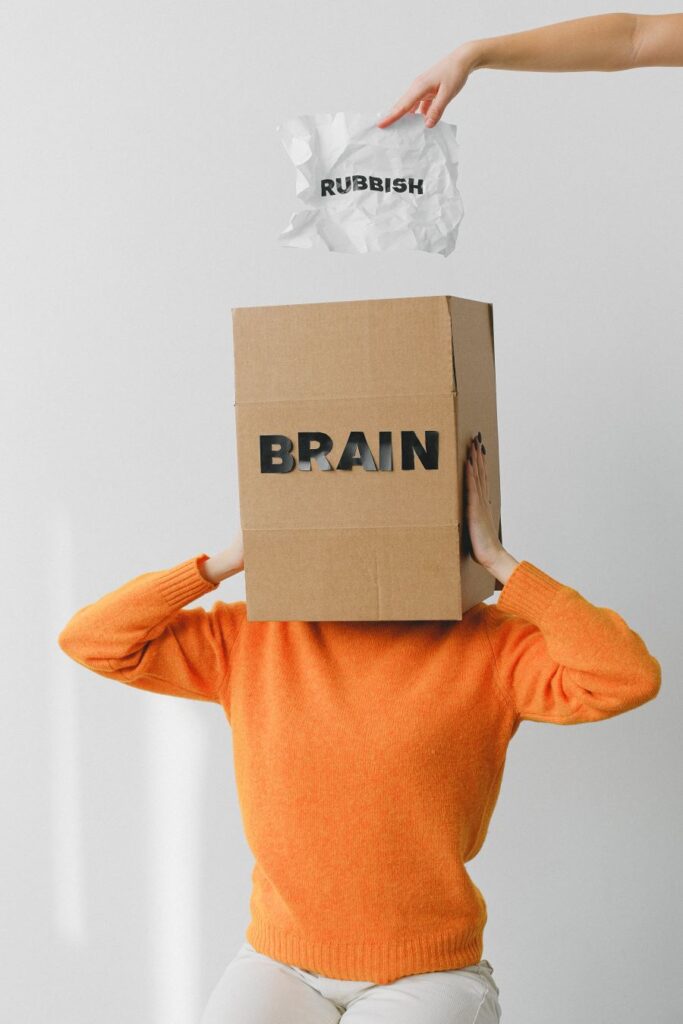
Are you finding it increasingly difficult to remember things? Do you often misplace your keys or forget important appointments? If so, you’re not alone. Memory loss strain can have a significant impact on our mental health and overall wellbeing and makes you feel like you’re losing your mind.
I know it drives me a tad crazy when I can’t find my phone because I forgot where I put it. Does anyone else constantly have to ask a family member to “call” me so I can hear it ringing?
I also constantly mull over thoughts as to whether I actually told my husband something that was on my mind, or whether I wanted to remember to tell him later. (Repeating stories is something that gets old, fast.) Let’s delve into the reasons behind memory loss and its effects on our daily lives.
Memory loss can occur for various reasons, including age-related cognitive decline, stress, or certain medical conditions. Regardless of the cause, experiencing memory loss can be frustrating and distressing. It can affect our ability to perform tasks, hinder our relationships, and lower our self-esteem, because of the feeling of losing your mind. It is heightened by having the feeling of brain fog from anxiety.
Understanding the impact of memories on mental health is essential for seeking appropriate support and care. It’s crucial to note that memory loss strain should not be ignored or dismissed as a normal part of aging. Identifying potential underlying causes and addressing them can improve our quality of life and overall wellbeing.
Let’s explore the various factors that contribute to memory loss, debunk common misconceptions, and provide practical strategies for coping with memory-related challenges. By unraveling the mysteries of brain recall, you can work toward a healthier mind and memory.
Read more on Breaking the Taboo: Speaking Out on Aging and Mental Health
Understanding Memory Loss Strain
Memory loss can occur for various reasons, including age-related cognitive decline, stress, or certain medical conditions. Regardless of the cause, experiencing loss of recall can be frustrating and distressing. It can affect our ability to perform tasks, hinder our relationships, and lower our self-esteem.
Memory loss can manifest in different ways, such as forgetting names, misplacing items, or struggling to recall recent events. These memory lapses can lead to feelings of embarrassment, brain fog from anxiety, and even depression. It’s important to recognize that significant memory loss is not a normal part of aging and should not be dismissed.
Understanding the impact of memories on mental health is essential for seeking appropriate support and care.
Read more on Debunking 11 Tired Stereotypes and Myths About Aging
Causes and Risk Factors of Memory Loss
Losing your memories can be caused by a variety of factors. Age-related cognitive decline is a common cause, as the brain undergoes changes over time.
Other factors, such as chronic stress, can also contribute to memory loss. Stress hormones can affect the brain’s ability to form and retrieve memories, leading to forgetfulness.
Certain medical conditions, such as Alzheimer’s disease, dementia, or traumatic brain injuries, can also result in a loss of recall. These conditions can have a profound impact on mental health and overall wellbeing.
It’s important to identify potential underlying causes of both short-term and long-term recall and address them to improve quality of life. It’s also imperative to not jump to conclusions and assume the worst about your memory loss strain, and believe you have developed a terrible condition resulting in losing your mind. Often, that is simply not the case.
Read more on The Art of Aging Gracefully: Simple Secrets Revealed
The Impact of Brain Fog from Anxiety on Mental Health
 Feelings of losing your mind goes beyond simple forgetfulness. It can have a significant impact on mental health. The frustration and distress caused by memory lapses can lead to feelings of brain fog from anxiety, depression, and low self-esteem.
Feelings of losing your mind goes beyond simple forgetfulness. It can have a significant impact on mental health. The frustration and distress caused by memory lapses can lead to feelings of brain fog from anxiety, depression, and low self-esteem.
Individuals may experience a loss of confidence and a sense of helplessness.
Loss of memory can also affect relationships. Forgetting important events or details can strain relationships with family, friends, and colleagues. It can lead to misunderstandings and feelings of neglect.
Additionally, individuals may withdraw from social activities due to fear of embarrassment or the inability to keep up with conversations.
Read more on Depression and the Elderly: The Hidden Struggle of Feeling Down
Losing Your Mind Sensations and Its Effects on Overall Wellbeing
The impact of memory loss strain extends beyond mental health. It can affect overall wellbeing in various ways. For example, individuals may struggle to perform everyday tasks, such as cooking or managing finances. This can lead to a loss of independence and increased reliance on others and exacerbate fears of losing your mind.
A reduction in mental acuity can also impact work performance. Forgetfulness and difficulty remembering information can hinder productivity and job performance. This can lead to increased stress and brain fog from anxiety and potential career setbacks.
Furthermore, feelings of losing your mind can impact one’s sense of identity and purpose. The ability to remember past experiences and achievements contributes to a sense of self.
When these memories are compromised, individuals may feel a loss of personal identity and struggle with their sense of purpose in life.
Read more on how to Escape A Boring Life After Retirement
Strategies for Preventing Brain Frog From Anxiety
While memory loss is a common concern, there are strategies that can help prevent or mitigate memory loss strain. Engaging in activities that stimulate the brain, such as puzzles, reading, or learning new skills, can help keep the mind active and improve memory function.
Maintaining a healthy lifestyle is also crucial for memory health. Regular exercise, a balanced diet, and sufficient sleep can all contribute to optimal brain function.
Avoiding excessive stress and managing stress levels through relaxation techniques, such as meditation or deep breathing, can also help prevent memory loss strain.
Read more about Trouble Sleeping At Night and What to Do
Cognitive Exercises and Activities to Improve Memory
Engaging in specific cognitive exercises and activities can help improve memory. These exercises focus on strengthening the brain’s ability to process and recall information. Examples include memory games, association techniques, or mnemonic devices.
These exercises can be practiced regularly to improve memory function.
Additionally, incorporating mental challenges into daily routines, such as learning a new language or musical instrument, can help stimulate the brain and improve memory capabilities. It’s important to find activities that are enjoyable and engaging to ensure long-term commitment.
Read more about Why A Sedentary Lifestyle is A Surprising Link to Dementia
Lifestyle Changes to Support Memory Health
In addition to cognitive exercises, making certain lifestyle changes can support memory health.
For example, organizing and decluttering living spaces can reduce the likelihood of misplacing items and improve overall cognitive function. Creating a routine and using reminders or calendars can also help with memory organization.
Maintaining social connections is also beneficial for memory health. Engaging in social activities and maintaining meaningful relationships can help stimulate the brain and prevent cognitive decline.
Additionally, staying mentally and socially active through hobbies, volunteering, or continuing education can contribute to overall brain health.
Read more about Senior Volunteering and Finding Purpose and Connection
Seeking Professional Help for Brain Fog From Anxiety
Above all, remember that if memory loss persists or worsens, it’s important to seek professional help. A healthcare provider can conduct a thorough evaluation to identify potential underlying causes and recommend appropriate treatment options.
They may also provide strategies and resources to cope with memory loss strain.
In some cases, medication or therapy may be necessary to address underlying medical conditions or mental health concerns contributing to memory loss. Seeking professional help is a proactive step toward managing memory loss strain and brain fog from anxiety and improving overall wellbeing so that you don’t feel you are losing your mind.
Support Resources for Individuals
There are numerous support resources available for individuals experiencing feelings of brain fog from anxiety. Support groups, both online and in-person, can provide a sense of community and understanding.
These groups allow individuals to share experiences, coping strategies, and emotional support.
Memory clinics and memory care facilities specialize in providing comprehensive care for individuals who may be struggling in this area. These facilities offer specialized programs, therapies, and support services tailored to the unique needs of those experiencing recall issues.
Oftentimes, there are also support groups for aging individuals and for those experiencing changes of various kinds at senior citizen centers in your community.
Whether it’s memory loss concerns, grief, lifestyle changes, or decisions about retirement living and making sure you are financially set for your senior years, these peer support groups for older adults can provide needed information and reassurances.
Read more about Red Flags to Look For In Elderly

Taking Control of Memory Health and Wellbeing
Recalling key information can have a profound impact on mental health and overall wellbeing. By understanding the causes and effects of potentially losing memories, individuals can take proactive steps to prevent or mitigate its strain.
Incorporating cognitive exercises, making lifestyle changes, and seeking professional help when needed can all contribute to improved memory health and overall wellbeing.
Remember, your memory matters, and taking control of it is essential for a healthier mind and memory. Even if that means asking a loved one to “ring your number” on occasion to help you locate your phone!
More from Senior Denial About Healthy Living
Here are some more articles about healthy living you might enjoy. Check them out:
- Is 65 the Magic Number for Being a Senior Citizen?
- What to Do After Retirement: Finding New Identity Beyond Work
- Living Alone? Discover How to Thrive as a Solo Ager
- Depression and the Elderly: The Hidden Struggle of Feeling Down
- Walking for Mental Health: Strolling Along to Better Wellness
- The Hidden Culprits Behind Stubborn Belly Fat in Seniors
- The Art of Aging Gracefully: Simple Secrets Revealed
- Debunking 11 Tired Stereotypes About Aging
- Costs for Health Insurance Coverage to Skyrocket
- Should You Get the Latest COVID-19 Vaccine?
Written by
Robin McClure
Robin is the author of 7 parenting books and has 3 grown children, 3 spoiled rescue dogs, and a very understanding husband. She holds a bachelor's degree in journalism and a master's degree in communications, and spends her time writing, drinking coffee, and planning the next grand adventure.



